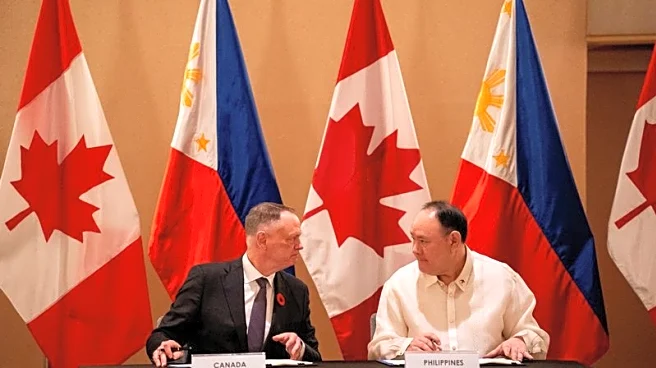MANILA (Reuters) -The Philippines and Canada signed a pact on Sunday for their armed forces to train on each other's soil, boosting defence cooperation to tackle common security concerns in the Indo-Pacific
region.
Canada's first such deal in the region, the Status of Visiting Forces Agreement (SOVFA) takes to five the number of accords on troops Manila has concluded with allies, in the face of China's increasingly assertive regional stance.
The deal broadens the Philippines' network of security ties while complementing a long-standing alliance with its treaty partner, the United States.
The pact sets up a framework for expanded military and defence cooperation, to improve coordination of operations by both armed forces.
"Underpinning the SOVFA is the foundation on which it is built," Philippine Defense Secretary Gilberto Teodoro told a press conference. "It is to preserve the rules-based international order."
Canada has consistently supported the Philippines' position in the South China Sea, backing a 2016 ruling by the Permanent Court of Arbitration that invalidated China's sweeping maritime claims. Beijing has rejected the tribunal's decision.
In 2023, both countries agreed to use Ottawa's Dark Vessel Detection System to identify ships engaged in illegal, unreported, and unregulated fishing, by tracking vessels that have disabled location transmitters to avoid detection.
Manila is also pursuing similar troop pacts with Britain and France. Last year it ratified a reciprocal access deal with Japan, Tokyo's first such accord in Asia, and already has a troop pact with Australia.
Last week the Pentagon said it had formed a new joint task force with the Philippines to beef up military readiness in areas such as the South China Sea, where Manila and Beijing have repeatedly clashed recently.
Australia, New Zealand, the Philippines and the United States held a drill in the South China Sea on October 30 and 31, which a Chinese military spokesperson criticised as having "seriously undermined peace and stability".
(Reporting by Karen Lema; Editing by Clarence Fernandez)











